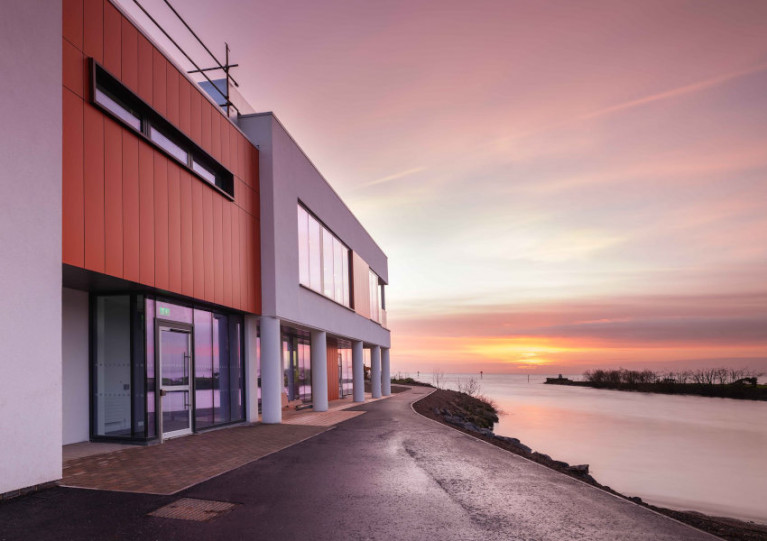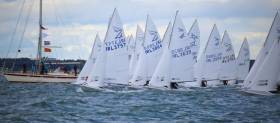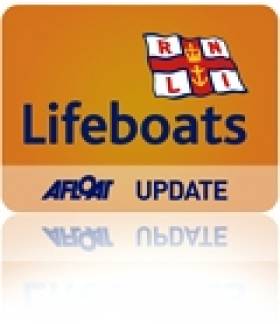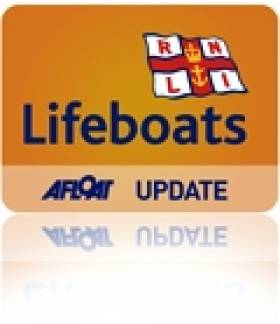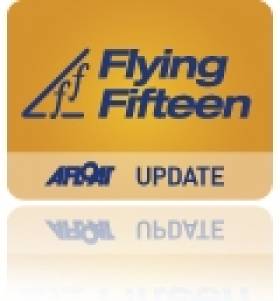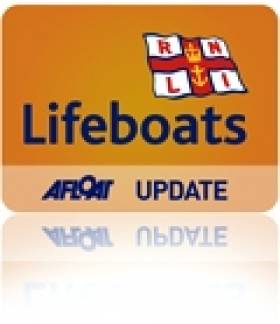Displaying items by tag: Antrim
Probe Into Major Fish Kill on River Near Lough Neagh
The Northern Ireland Environment Agency (NIEA) is investigating a confirmed fish kill near Crumlin in Co Antrim, as BBC News reports.
It follows reports of an alleged slurry spill in the Crumlin River upstream of the town close to Lough Neagh on Sunday morning (12 February).
Local angling representatives attended the scene and say they counted 25 dead fish in a 50-metre stretch of the river, which is best known for wild brown trout but also has salmon fry.
“So potentially there could be hundreds killed,” said David Kennedy of the Crumlin and District Angling Association, who added that a year of spawning may have been lost in the incident.
BBC News has more on the story HERE.
Inver Colpa Men's Team Win at the Islandmagee Challenge in Antrim
Inver Colpa Coastal Rowing Club attended this summer's Islandmagee Challenge.
The men’s senior team set off early morning to make the journey to Whitehead, Co. Antrim, located on the picturesque coastline between Belfast and Larne. The race course was originally set to start in Brownes Bay and follow the Islandmagee peninsula south to finish in the town of Whitehead. The wind was stronger than hoped for so the course was changed at the 11th hour on the grounds of health & safety, and the start and finish line were set for Whitehead itself. Despite the so called strong wind, conditions were excellent, with no rain and a relatively calm sea.
The men’s team was made up of Darragh Farrell, Andrew Cassidy, Andy Grennan and James McKevitt, with Glenda Murphy the Coxswain and the team's spiritual leader. There were thirteen boats in the race, split between two categories; traditional skiffs and all-Ireland one-design yawls. The Inver Colpa boat took off to a great start, with the four lads using their imposing strength to get out ahead of the other boats from the off. From that point on it was down to tactical coxing from Glenda and the fitness of the crew to hold the lead. Despite the surrounding beauty of the cliffs, birdlife and lighthouse, all focus was on winning the race. Having trained all summer, and following the disappointment of the Row around Rockabill Race the previous month, the four men put in a herculean effort to lead the race from start to finish. They left everything out there, Andy Grennan in particular. Inver Colpa clocked the fastest time in their category, but also the fastest time overall.
Whitehead is a beautiful town, a traditional holiday destination dating from Victorian times, with pretty seafront houses and a promenade. All involved in the event were invited back to the yacht club for food and drink. Although the team are all finely tuned athletes they relaxed and enjoyed all that the yacht club bar had to offer, well earned after the day’s endeavours. Following a minute’s silence to acknowledge Queen Elizabeth’s recent death, the winners medals were presented. Inver Colpa received the trophy, an engraved decanter. The trip home to Drogheda was long but the spirits were high.
The club look forward to returning to compete in the Islandmagee Challenge again next year and defend their title. All going to plan the club plans to enter two boats in 2023 with both men’s and women’s teams. Inver Colpa extend their sincere thanks to Whitehead Rowing Club for all their hospitality and a thoroughly enjoyable day.
Lough Neagh Tourism Projects get €66k Funding Commitment
Antrim and Newtownabbey Borough Council has agreed funding of £66,000 for tourism projects by the Lough Neagh Partnership over the next three years, as the News Letter reports.
Current projects at the north end of Lough Neagh include a new sculpture, interpretive display and improvement works at The Gateway centre in Antrim, which are scheduled to be completed by the end of March.
And recently a new boardwalk and path were completed at the adjacent Lough Shore Park, where the Six Mile Water meets the lough.
Mayor of Antrim and Newtownabbey, Councillor Jim Montgomery, said: “Lough Neagh is one of the greatest tourism assets, not only for our borough but across Northern Ireland.”
The News Letter has more on the story HERE.
With good numbers of Flying Fifteens turning out at club level in Dublin and Strangford Lough the 20–foot keelboat class take to the road to Cushendall Sailing & Boating Club who host the Flying Fifteen Championships of Ireland this weekend, in what is one of the most picturesque settings in the country beneath the Glens of Antrim.
There is also a vibrant fleet along the north east coast in Whitehead, Larne and Cushendall.
As usual in this fleet it is very hard to call the winner as the racing is always close and exciting and any of a number of boats could win. An interesting fact in this fleet is that nobody has ever retained the trophy since it was first presented in 1986.
Current holders Dave Gorman & Chris Doorly (NYC) will be hoping to ‘buck’ that trend as they will be one of the favourites for the title.
Others hoping to stop them will be Sean Craig & Alan Green (NYC) recent winners of the South Coast Championships, Andy McCleery & Colin Dougan (KYC), Brian Willis & John McPeake, and Ian Mathews & Keith Poole (NYC) amongst others. Word is that former National champion Darren Martin & Simon Murray(SLSC) are going to compete, currently they are sailing on the SB20 circuit.
'Poisonous Parsnips' Warning For NI Beaches
#CoastalNotes - 'Poisonous parsnips' on Co Antrim coastal beaches have prompted warnings to dog owners, as BelfastLive reports.
Warning signs were put up at Ballygally, Carnfunnock and Drains Bay earlier this month after locals found evidence of hemlock water dropwort roots, which are extremely toxic to animals – particularly at this time of year.
It's thought that the plant is previously responsible for the death of at least one dog that tried to eat one at Drains Bay in 2014.
In other recent news from Northern Ireland, a seal spotted swimming in the River Lagan has been hailed as a sign of its good water quality.
Video of what appears to be a grey seal happily bobbing along upstream near the Ormeau Embankment was captued by Belfast man Brendan McNeice, who thought the sight "unusual".
But marine wildlife expert Tanya Singleton told UTV News that seals swimming so far up the river is actually a regular occurrence – and a good sign for the waterway's health as they chase booming fish stocks as far as Lisburn.
#rnli – The RNLI has today announced that following a review of lifeboat cover in Northern Ireland, an additional all weather lifeboat will be put on service on the North Antrim Coast. This lifeboat will be based in Cushendall for a 24 month trial and will operate alongside the current inshore lifeboat at Red Bay RNLI.
The decision was made following the RNLI's Trustees agreement with the Operations Committee's in-depth review of lifeboat cover in the area. The RNLI carries out a five yearly review of all lifeboat stations, including the incidents its lifeboats launch to and the changing pattern of marine activities, to ensure existing and future lifeboat coverage is correct for the area.
The current Red Bay RNLI inshore lifeboat is operating in a place well known for strong tidal streams and rough sea conditions with the nearest all weather lifeboat stations based at Portrush (30 miles), Larne (17 miles) and Campbeltown (32 miles). All weather lifeboats can be operated safely in all conditions while inshore lifeboats usually operate closer to shore and cliffs, in shallower water and among rocks or caves. The RNLI felt that the provision of an extra all weather lifeboat in this area would meet the charity's 'concept of operations' on the North Coast.
The volunteer lifeboat crew at Red Bay RNLI have launched on 33 occasions in wind speeds of Force 5 or higher between 2008 and 2013, which resulted in 27 rescues and five people being saved. The addition of an all weather lifeboat in this location will ensure even greater coverage on the North Antrim Coast.
A lifeboat station was established in Cushendall on the Antrim coast between Larne and Ballycastle in 1972. Since then Red Bay RNLI volunteer lifeboat crews have launched 516 times, brought 489 people to safety and saved 114 lives. Last year alone, Red Bay RNLI launched 22 times bringing 36 people to safety. Of those launches, six services were carried out in the hours of darkness.
Responding to the announcement, Paddy McLaughlin from Red Bay RNLI said: 'We are delighted that the RNLI have decided to trial an all weather lifeboat on the north coast, to be operated alongside our Atlantic 85 lifeboat. Our volunteer lifeboat crew can face some challenging conditions, which are sometimes on the margin of the capabilities of an inshore lifeboat. The provision of an additional all weather lifeboat on the north Antrim coast means our lifeboat crew can launch in all conditions, day or night, up to 100 miles off our coastline.'
Darren Byers, RNLI Divisional Operations Manager added: 'Our charity's priority is to save lives at sea and by conducting regular reviews of lifeboat cover around our coastline, we can ensure we provide the best possible search and rescue service.
'The co-location of the new lifeboat for a trial period of 24 months will allow us to assess the long-term value for this type of lifeboat while ensuring that the RNLI has the right type, balance and capability of lifeboats on the coast, to respond to all types of maritime emergencies.'
The timescale for the arrival of the all-weather lifeboat has yet to be confirmed but will coincide with the training of the volunteer lifeboat crew to meet the demands of their new vessel.
Red Bay Lifeboat Rescues Lone Sailor
#RNLI - The volunteer lifeboat crew with Red Bay RNLI in Co Antrim were paged on Friday evening (12 September) at 6.55pm to a lone sailor on a 22ft yacht who got into difficulty in strong tides off the North Antrim coast.
The sailor had left Portrush for Bangor at 7am that morning and requested assistance from Belfast Coastguard later in the day after he was unable to make any headway in the seas.
The lifeboat had difficulty locating the vessel due to fog and the fact that the tides had pushed the boat some four miles off course south of Rathlin Island.
However, once located, the yacht was towed by the Red Bay lifeboat crew to Cushendall, arriving at 9.45pm.
Red Bay RNLI spokesman Paddy McLaughlin commented: "Tonight's call out was made more difficult due to the strong tides and fog but we were able to locate the sailor using our onboard VHF direction-finding equipment and radar."
The volunteer lifeboat crew from Cushendall have been kept busy over the past few months answering a large number of emergency calls off the North Antrim coast.
#flyingfifteen – National Flying Fifteen champions Ian Mathews and Keith Poole of Dun Laoghaire could not match Roger Chamberlain and Charley Horder for Northern Championship honours at Cushendall Sailing Club today. The Strangford Lough pair moved up a gear from the last meet at Carlingford a month ago to win the 20–boat championships by four points. Results sheet available to download below.
While other east coast sailing events were becalmed the Fifteens enjoyed a good sailing breeze off the Antrim coast at Red Bay even if Saturday's winds were shifty.
Three windward leeward courses were sailed on Saturday in the lighter winds but today saw triangle courses in up to 20 knots of breeze.
Third overall in the keelboat class was another Northern Ireland based Flying fifteen, Stifflers Mom, sailed by Brian McKee and John Gibson of Portaferry.
There was applause for the excellent race management at Cushendall and also for the shoreside marshalling and local hospitality.
Full class report below:
What a weekend that was in Cushendall at the foot of the amazing Glens of Antrim. With wind and sunshine you would be forgiven for thinking we were on the continent. Twenty boats took part in The Flying Fifteen Northern Championships in the picturesque village of Cushendall at the weekend hosted by Cushendall Sailing Club. The welcome and hospitality were great and very appreciated by those who traveled. Roger Chamberlain & Charlie Horder (SLSC) won the event comfortably on the score board withr some very consistent results and could even afford to retire from the last race. Ian Mathews & Keith Poole (NYC) were second with McKee & Gibson (SLSC) third.
Saturday morning there was a light breeze, more than enough for racing but it was to be shifty in a challenging tide.
Race1: the fleet got away at first time of asking, on the beat the fleet split tacks but those on the left came in to the weather mark first, Niall & Nikki Meagher sailing Ffantastically Mr Fox(NYC) lead the way followed closely by Green/Mulligan in Frequent Flyer. Downwind they increased their lead, on the second beat the Meaghers stayed out as Green went left closer to the shore. As they tacked for the weather mark there was a drop in pressure and a major shift, the two lead boats had their spinaker's up before the mark, unfortuently for the Meaghers Green got inside as did many others who went in towards the shore. On the final run with the course shortened as the wind dropped the whole fleet bunched up but Green held on to take the gun beating over the line followed very closely by Chamberlain, McCleery, Marcus Creighton and Mulvin who all drifted towards the line faster.
Race 2: the fleet set off in shifty conditions. Midway through the race the breeze was battling with a sea breeze, the tide was strong running south towards Belfast but it was supposed to be going out! Chamberlain was going well with McCleary and Mathews going wel, also having another good race was Marcus Creighton (SSC)and Joe Coughlin (NYC) The PRO again shortened the course and the top positions didn't change, even on the last beat place were lost and gained with the shifts.
Race 3: we thought the wind had settled to a sea breeze but there were a couple of shifts shortly after the start, there was also a strong tide especially out on the right. On the beat most boats headed towards the shore, after a few short tack Gorman/Doorly (NYC) got to the weather mark first just ahead of Mulvin and Chamberlain with Mathews and McCleary close behind. The wind remained steady, on lap two Chamberlain got inside Mulvin to take second place, Mulvin sailing extremely well kept the pressure on Chamberlain but remained in third place at the finish. All three laps were completed, the first full race of the day!
Once ashore the club put on great entertainment and food, after the refreshments some crews headed up to Giants Causeway for a bit of culture others into JJ's pub also for a bit of culture. Sunday morning greeted us with beautiful sunshine and a nice breeze from the NW, perfect conditions for racing. The tide was coming in most of the morning but even though it is open sea the tide does turn well before the high water.
Race 4: the fleet got going at the second time of asking, the pin end was favoured and the majority of boats headed inshore, some including McKee went right. McKee arrived at the weather mark first just ahead of Gorman and Mathews. Today we had a triangle and the reaches were exciting. McKee held on to take the gun with Mathews second and Chamberlain third crossing the line with Gorman. Chamberlain was now in pole position to win the event.
Race 5: again the pin was favoured and most boats headed for the shore, there was an individual recall and McCleary and Chamberlain had to go back. McKee again went right. It clearly paid as he came to the weather mark followed very closely by Mathews, Gorman and Murphy. Downwind Malcom Crighton and Tom Murphy went left and went into second and third place. The next beat was again shifty with different wind strengths up the course Murphy was sailing really well and moved into second place. On the reaches some places changed but Mc Kee held on to win with Murphy second and Mathews third
The silver, bronze and classic fleet were close affairs and all the results can be seen on website www.flyingfifteen.ie. For our second regional championships, the competition in the fleet was as keen as ever with very close racing. Even though Roger and Charlie won with a race to spare the racing was incredibly close with boats crossing the line together on the water.
Roger Chamberlain thanked the club Commodore for an enjoyable event, the sponsors, the PRO and his team, his fellow competitors and even his crew Charlie who then went on to thank everybody again! A special word of thanks from from Roger in his capacity of FFAI President was for those who prepared the fantastic food and for the shore team that helped get us on and off the water. Those who didn't travel missed an enjoyable event in a fantastic setting. The next event is the Championships of Ireland which will be held in Portaferry in August.
#RNLI - Red Bay RNLI's lifeboat launched on service early on Easter Sunday morning to go to the aid of a support boat with two people on board near Glenarm, Co Antrim.
The boat had suffered engine failure and was driven ashore by the wind and swell.
The Red Bay RNLI lifeboat launched at 9.20am and the crew subsequently rescued the two people from the vessel before towing the boat clear of the rocks. No one was injured in the incident.
The boat is now in Glenarm Marina. The lifeboat returned to station at 11.00am. The operation was co-ordinated by the Belfast Coastguard.
Body Recovered Off Antrim Coast Confirmed As Missing Polish Angler
#Missing - The body recovered off the Antrim coast last Friday has been confirmed as that of a the Polish national who went missing while sea angling with friends in Portrush a month ago.
Last weekend Afloat.ie reported on the recovery of a man's body off the Antrim coast on Friday 11 October.
And according to the Belfast Telegraph, the PSNI has since confirmed that the body has been identified as 38-year-old Jaroslaw Andrykiewicz.
Andrykiewicz, who had been living in Northern Ireland for six years, was swept out to sea while fishing on rocks at Ramore Head on 14 September.
The search operation was slowed in the first few days by stormy conditions along the North Antrim coast, and was eventually wound down earlier this month.
The Belfast Telegraph has much more on this sad story HERE.



























